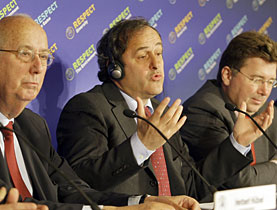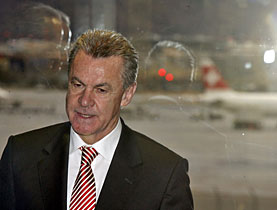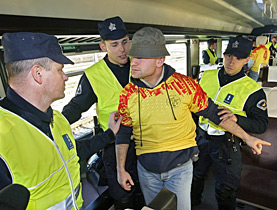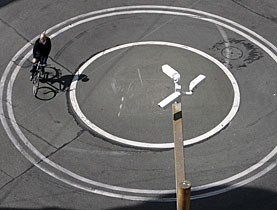Football officials prepare to draw first blood

Players have been warned they will be facing blood and urine tests for doping before and during the European football championships co-hosted by Switzerland and Austria.
Uefa, the game’s governing body in Europe, decided to push ahead with the checks even though it does not believe doping to be a widespread problem and does not expect it to be an issue during the tournament in June.
Officials said in Vienna on Wednesday that they would be conducting blood tests for the first time in the history of the tournament, which will be taking place in eight Swiss and Austrian cities. Blood tests were already carried out at the 2006 World Cup in Germany.
According to specialists, blood testing can detect more sophisticated methods of doping.
“I don’t think there is any form of organized doping in soccer,” Uefa president Michel Platini said. “Some players make mistakes, but there is no structure of clubs or doctors behind them who help dope. However, we cannot be silent about the subject. Not talking about it does not mean it doesn’t happen.”
Officials said that this will also be the first time players in any major football tournament will be tested for growth hormones. Tests for these have only been available since late 2007.
Serious matter
Ralph Zloczower, president of the Swiss Football Association, said that his organisation would be taking any cheating seriously.
“The Swiss Football Association has also been fighting against doping for years and Uefa’s vision fits perfectly with ours,” he told swissinfo.
“We want to take this problem seriously, even if we hope there won’t be any cases. We are doing everything we can to ensure none of our team members is affected by doping,” he added.
Officials will collect samples from two players from each team and send them to the Swiss doping analysis laboratory at Lausanne University after each of the tournament’s 31 matches, officials said.
Players caught cheating will be punished on an individual basis, according to Marc Vouillamoz, chairman of Uefa’s anti-doping unit. But he added that teams with two or more players testing positive would be at risk of facing sanctions on a wider scale. He said it depended on the seriousness of the violation.
Clean players
Swiss coach Köbi Kuhn says the decision to test players’ blood is not that surprising.
“Even in 1966 [during the World Cup in England], some players were tested [for doping.] It’s perfectly normal. But football isn’t like other sports; it’s much harder to take banned substances.”
He is confident that his side will remain clean.
“I don’t know what happens in other teams, but I’m sure nobody is doped in the Swiss team,” he told swissinfo.
Just to make sure that everyone is in the picture, Uefa will hold a workshop on doping for the 16 teams competing in the tournament.
swissinfo with agencies
In recent years, athletes around the world have come under increased scrutiny by anti-doping regulators.
In the United States, a number of baseball players have been summoned before political committees to explain abrupt and dramatic boosts in performance, and champion sprinter Marion Jones recently began a prison sentence for perjury in a drugs investigation.
In 2006, the Swiss-based Phonak cycling team was disbanded after its star and Tour de France winner, Floyd Landis, tested positive for doping.
In 1998, Canadian snowboarder Ross Rebagliati recovered his Olympic gold medal after officials deemed that a positive marijuana test did not violate the rules.

In compliance with the JTI standards
More: SWI swissinfo.ch certified by the Journalism Trust Initiative



You can find an overview of ongoing debates with our journalists here. Please join us!
If you want to start a conversation about a topic raised in this article or want to report factual errors, email us at english@swissinfo.ch.